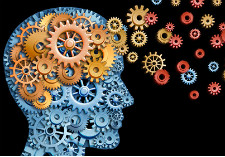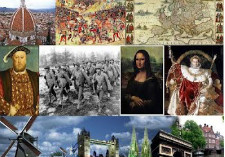 AP World History
AP World History
Advanced Placement World History is a challenging two term course that is structured around the investigation of selected themes woven into key concepts covering distinct chronological periods/eras. AP World History is equivalent to an introductory college survey course. The course has a threefold purpose. First, it is designed to prepare students for successful placement into higher level college and university history courses. Second, it is designed to develop skills of analysis and thinking in order to prepare students for success in the twenty-first century. Finally, it is the intent of this class to make the learning of world history an enjoyable experience. Students will be able to show their mastery of the course goals by taking part in the College Board AP World History Exam. The five themes of AP World History are described below:
1. Interaction between humans and the environment (Environment)
Demography & disease; migration; patterns of settlement; technology
2. Development and interaction of cultures (Culture)
Religions, philosophies, & ideologies; science & technology; arts & architecture
3. State-building, expansion, and conflict (Political)
Political structures & forms of governance; empires; nations & nationalism; revolts &
revolutions; regional, transregional, and global organizations
4. Creation, expansion, and interaction of economic systems (Economic)
Agriculture & pastoral production; trade & commerce; labor systems; industrialization; capitalism & socialism
5. Development and transformation of social structures (Social)
Gender roles & relations; family and kinship; racial & ethnic constructions; social & economic classes
 AP Psychology
AP Psychology
Psychology is the study of how humans think, feel, behave, and interact with one another. This course is designed to give you a broad overview of psychology. The following subjects will be discussed: various approaches to psychology, the function of the brain, cognitive processes, human development, counseling approaches, personality theory, psychological disorders, and socio-cultural influences. The purpose of AP® Psychology is to introduce students to the systematic and scientific study of the behavior and mental processes of human beings and other animals.
This course aims to help students:
- Understand the fundamental concepts and theories of psychology.
- Learn the basic skills of psychological research, and use these skills to devise research projects and interpret research results.
- Relate psychological principles to their own lives.
- Develop introspective skills to examine their decisions and relationships more thoroughly.
- Use their growing knowledge of psychology to carefully and objectively evaluate current theories, trends, and issues in the field of psychology.
- Prepare for successful completion of the Advanced Placement Psychology exam.
 AP Human Geography
AP Human Geography
The Advanced Placement Human Geography course reflects the content of a typical college level survey introductory course in human geography. Through the five goals of the course, students will refine their analytical and problem solving skills using creative and critical thinking to develop abilities to:
• Use and think about maps and spatial data.
• Understand and interpret the implications of associations among phenomena in places.
• Recognize and interpret at different scales the relationships among patterns and processes.
• Define regions and evaluate the regionalization process.
• Characterize and analyze changing interconnections among places.
These skills will be practiced and mastered through the investigation of seven interdependent units of study as outlined
by the College Board Advanced Placement Human Geography course description. Throughout these units, students will
examine current trends in geography as well as geography related careers.
 AP Microeconomics
AP Microeconomics
The purpose of AP Microeconomics is to provide students a thorough understanding of the principles of economics that apply to the functions of individual decision makers, both consumers and producers, within the economic system. It places primary emphasis on the nature and functions of product markets, and includes the study of factor markets and of the role of government in promoting greater efficiency and equity in the
economy. You will learn to create, interpret, label, and analyze graphs, charts, and additional data to describe and explain various economic concepts.
Main topics include:
- Introduction to Economics and basic concepts: scarcity, needs, wants, goods, services, opportunity costs, production possibility frontiers
- Microeconomics of Product Markets: supply and demand, pricing, costs of production, types of competition(perfect, monopoly, monopolistic, oligopolistic)
- Microeconomics of Factor Markets: demand for resources, wages, profit, interest, rent
- Microeconomics of Government: market failure, taxation
- Microeconomic Issues: regulation, income inequality, poverty, labor (unions, discrimination, immigration), health care
 AP European History
AP European History
This course is taught at the college level. Students are frequently required to analyze, synthesize and evaluate primary and secondary historical sources, in addition to comprehending, memorizing and applying facts. The study of European history since 1450 introduces students to cultural, economic, political, and social developments that played a fundamental role in shaping the world in which they live. This course challenges students to read critically, weigh evidence and interpret problems presented by historians. Through assessment and critical analysis of historical documents and interpretations of them, students learn to analyze data, form conclusions, and present well-reasoned, persuasive arguments in written form. Without this knowledge, we would lack the context for understanding the development of contemporary institutions, the role of continuity and change in present-day society and politics, and the evolution of current forms of artistic expression and intellectual discourse.
The Course Objectives:
- Reason historically about continuity and change over time and make comparisons among various historical developments in different times and places.
- Recognize point of view, bias and propaganda, and describe their importance in the unfolding of events in European history.
- Acquire an appreciation for history, Europe’s unique role in modern world history, and the importance of individual and societal choice and action.
- Participate in critical thinking and formulate higher thinking skills through class discussion.
- Write analytic and interpretive essays within a limited timeframe.
- Learn to see history through a Christian perspective.
- Successful completion of the AP European exam.



